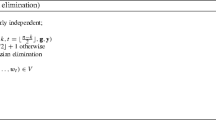Abstract
The theory of algebraic codes is a perfect illustration of the fact that the more mathematical structure one is able to add to a system, the better are the descriptions one obtains: Changing from codes to linear codes, it is no longer necessary to compute all distances between any two codewords, only the codeword weights, in order to find the minimum distance. Going from linear codes to cyclic codes then, the linear structure is replaced by a much richer algebraic structure, and general results on properties of codes such as the BCH-bound, fast decoding algorithms, etc., may be developed.
Thus it was an important result realizing that shortened Generalized Reed-Muller (GRM) codes are cyclic codes, since the GRM codes themselves were constructed only as linear codes. And it was interesting when S.D. Berman (see [1]) in 1967 discovered that the Reed-Muller codes over GF(2) may be described as ideals in a very natural algebra, namely the group algebra over an elementary abelian 2-group. Based on some properties of the GRM codes discovered by T. Kasami et al. in 1968 (see [7]), P. Charpin then could prove (see [2]) that a similar fact holds over GF(p).
In retrospect, one is left with the impression that it is an extensive and complicated piece of work to establish these facts. Here, we go the opposite way and start with the algebra, develop some general properties, focus on some very basic ideals which happen to be the GRM codes. Our approach is very natural and is based on some classical results on group algebras developed by S. Jennings (see [6]) in the early forties, which P. Charpin apparently was unaware of. These results are straightforward when the underlying group is elementary abelian, and may be developed from scratch.
The same methods apply to not only the extended Reed-Solomon codes but to all GRM codes over arbitrary finite fields.
While the first sections may be of most interest to representation theory, our last section contains a new decoding algorithm of the Reed-Muller codes, which takes advantage of the underlying algebra structure, thus justifying the whole approach. There are definitely methods there, which may be applied to other group codes, such as those based on algebraic geometry.
Similar content being viewed by others
References
S.D. Berman, On the theory of group codes, Kibernetika, Vol. 3 (1967), pp. 31–39.
P. Charpin, Codes ideaux de certaines algebres modulaire, These de 3ieme cycle, Universite de Paris VII (1982).
P. Charpin, The extended Reed-Solomon codes considered as ideals of a modular group algebra, Annals of Discrete Math, Vol. 17 (1983), pp. 171–176.
P. Charpin, A new description of some polynomial codes: The primitive generalized Reed-Muller codes, to appear.
B. Huppert and N. Blackburn, Finite groups II, Springer Verlag, Berlin, (1982).
S.A. Jennings, The structure of the group ring of a p-group over a modular field, Trans. Amer. Math. Soc., Vol. 50 (1941), pp. 175–185.
T. Kasami, S. Sin and W.W. Peterson, Some results on cyclic codes which are invariant under the affine group and their applications, Information and Control, Vol. 11 (1968), pp. 475–496.
J. van Lint, Coding Thoery, Springer Lecture Notes, Vol. 201, Springer Verlag, Berlin (1971).
A. Poli, Codes stables sous les groupes des automorphismes isometriques de A = F p[X 1,...,X n]/X P1 - 1, ..., X Pn ), C.R. Acad. Sc., Paris (1980), pp. 1029–1032.
H.N. Ward, Visible Codes, Arch. Math., Vol. 54 (1990), pp. 307–312.
Author information
Authors and Affiliations
Additional information
Communicated by D. Jungnickel
Rights and permissions
About this article
Cite this article
Landrock, P., Manz, O. Classical codes as ideals in group algebras. Des Codes Crypt 2, 273–285 (1992). https://doi.org/10.1007/BF00141972
Received:
Revised:
Issue Date:
DOI: https://doi.org/10.1007/BF00141972



